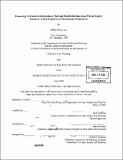| dc.contributor.advisor | Karl Seidman. | en_US |
| dc.contributor.author | Levy, Jeffrey Elliot | en_US |
| dc.contributor.other | Massachusetts Institute of Technology. Dept. of Urban Studies and Planning. | en_US |
| dc.date.accessioned | 2006-06-19T17:35:48Z | |
| dc.date.available | 2006-06-19T17:35:48Z | |
| dc.date.copyright | 2005 | en_US |
| dc.date.issued | 2005 | en_US |
| dc.identifier.uri | http://hdl.handle.net/1721.1/33049 | |
| dc.description | Thesis (M.C.P. and S.M.)--Massachusetts Institute of Technology, Dept. of Urban Studies and Planning, 2005. | en_US |
| dc.description | Includes bibliographical references (p. 150-156). | en_US |
| dc.description.abstract | The post-WWII period has seen a radical change in the growth patterns and composition of American cities, as a decentralized form of real estate development, conventional development, has become the dominant real estate development paradigm. As conventional development has become pervasive it has contributed to a host of negative economic, social, and environmental impacts. Growing dissatisfaction and concern over these negative impacts has given rise to development models that seek to accommodate the demand for new built space through alternative spatial forms, development locations, development practices, and development products. Collectively called "alterative development", these development models seek to minimize or eliminate potential negative social and environmental externalities caused by real estate development. While alternative development has gained some traction in the real estate development industry, it still faces significant barriers. Chief among these barriers is the lack of access to reasonably priced debt and equity capital. As the availability of financial capital is one of the key factors determining what gets built, when, and where, the lack of access to capital for alternative development has profound effects on the economic, social, and environmental health of our communities. | en_US |
| dc.description.abstract | (cont.) This thesis argues that one solution to overcoming the financing barrier, and expanding access to capital for alternative development projects, is through the development of a "real estate social investment" framework and the use of this framework to guide the investment decisions of capital delivery vehicles that can deliver reasonably priced capital to alternative development projects that produce financial returns plus social and environmental returns (the double bottom line). This thesis offers suggestions on what a real estate social investment framework might entail and how the financial, social, and environmental return components could be measured and evaluated. This framework is then used as a lens through which to examine the existing practice of double bottom line (DBL) real estate private equity investment funds. Through analyze of existing theory and practice surrounding social investing and double bottom line real estate private equity funds, recommendations are proposed to advance both the practice of DBL real estate private equity funds and the development and maturation of a real estate social investment industry. | en_US |
| dc.description.statementofresponsibility | by Jeffrey Elliot Levy. | en_US |
| dc.format.extent | 156 p. | en_US |
| dc.format.extent | 10568356 bytes | |
| dc.format.extent | 10577213 bytes | |
| dc.format.mimetype | application/pdf | |
| dc.format.mimetype | application/pdf | |
| dc.language.iso | eng | en_US |
| dc.publisher | Massachusetts Institute of Technology | en_US |
| dc.rights | M.I.T. theses are protected by copyright. They may be viewed from this source for any purpose, but reproduction or distribution in any format is prohibited without written permission. See provided URL for inquiries about permission. | en_US |
| dc.rights.uri | http://dspace.mit.edu/handle/1721.1/7582 | |
| dc.subject | Urban Studies and Planning. | en_US |
| dc.title | Financing alternative development through double bottom line private equity funds & a real estate social investment framework | en_US |
| dc.title.alternative | Financing alternative developments through DBL private equity funds & a real estate social investment framework | en_US |
| dc.type | Thesis | en_US |
| dc.description.degree | M.C.P.and S.M. | en_US |
| dc.contributor.department | Massachusetts Institute of Technology. Department of Urban Studies and Planning | |
| dc.identifier.oclc | 62120545 | en_US |
